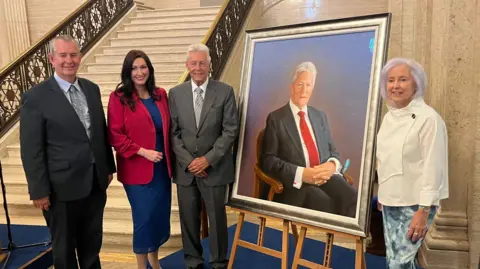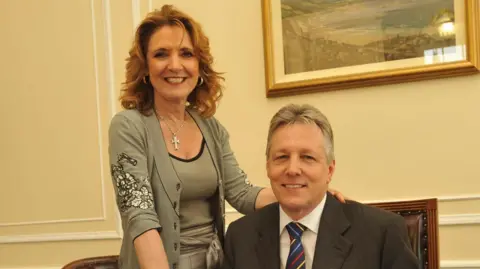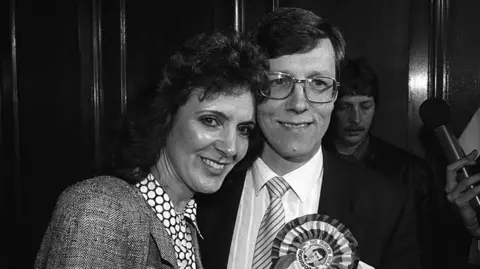Peter Robinson praises wife's courage after cancer diagnosis
 BBC
BBCThe former DUP leader and First Minister of Northern Ireland, Peter Robinson, has spoken for the first time of his wife Iris's battle with cancer.
He revealed she had faced "ups and downs" in recent years, which he said had contributed to delays in the unveiling of his official portrait at Stormont.
The unveiling took place at Stormont on Tuesday, with a special event marking the 76-year-old's contribution to politics.
Robinson said his wife had shown "remarkable courage and tenacity" in dealing with her illness.
 PA Media
PA MediaRobinson was leader of the Democratic Unionist Party (DUP) and first minister from 2008 until 2015.
His wife Iris was also a former DUP assembly member and MP but resigned following a financial and marital scandal in 2010.
She has largely stayed out of attending frontline political events in the 15 years since then.
Among those who attended Tuesday's event were Robinson's children, Deputy First Minister Emma Little-Pengelly and other Stormont politicians.
The portrait was created by artist Carol Graham who also commissioned the painting of former Speaker Lord Alderdice.
 Pacemaker
PacemakerRobinson told BBC News NI that his wife had been dealing with health complications as a result of operations to treat her cancer.
"She's going through the ups and downs - one day she's in perfect form, the next day she's having to deal with issues like all who go through that," he added.
"It brings me out with a lot more respect for those involved in our health service. We really do have some tremendous people working in it and they don't get the credit they deserve.
"Maybe more funding should go to them rather than administrators of the process, but that's another argument for another day."
The current Assembly Speaker, Edwin Poots, also paid tribute to Robinson, saying it was "no coincidence" that the longest period of political stability happened during his time in office.
"Peter and his skills ensured this assembly didn't have the interruptions that happened previously or afterwards," he said, adding that he felt the institutions were in a "better position" now than they had been for some time.
'Critics in the cheap seats'
Robinson also hit out at those who he called "critics in the cheap seats", or those who would seek to abuse politicians on social media.
"I salute those who have stood up to intimidation but nonetheless it has an impact and discourages people from coming forward for public service," he added.
He said it seemed "disproportionately directed" towards women.
Robinson ended his remarks by saying that there were "boundless opportunities" to improve the lives of people in Northern Ireland.
"We have something very special - for those who haven't lived through dark days we now have people living in a shared society, with so much work yet to be done," he said.
Asked if he believed he would live to see a border poll, Robinson replied: "I think when the earth is put on my coffin we will still be in the United Kingdom."
He added that the issue of Irish unity was a "distraction" from work to improve people's lives and that there was "no reason why" the government should move towards calling a border poll.
